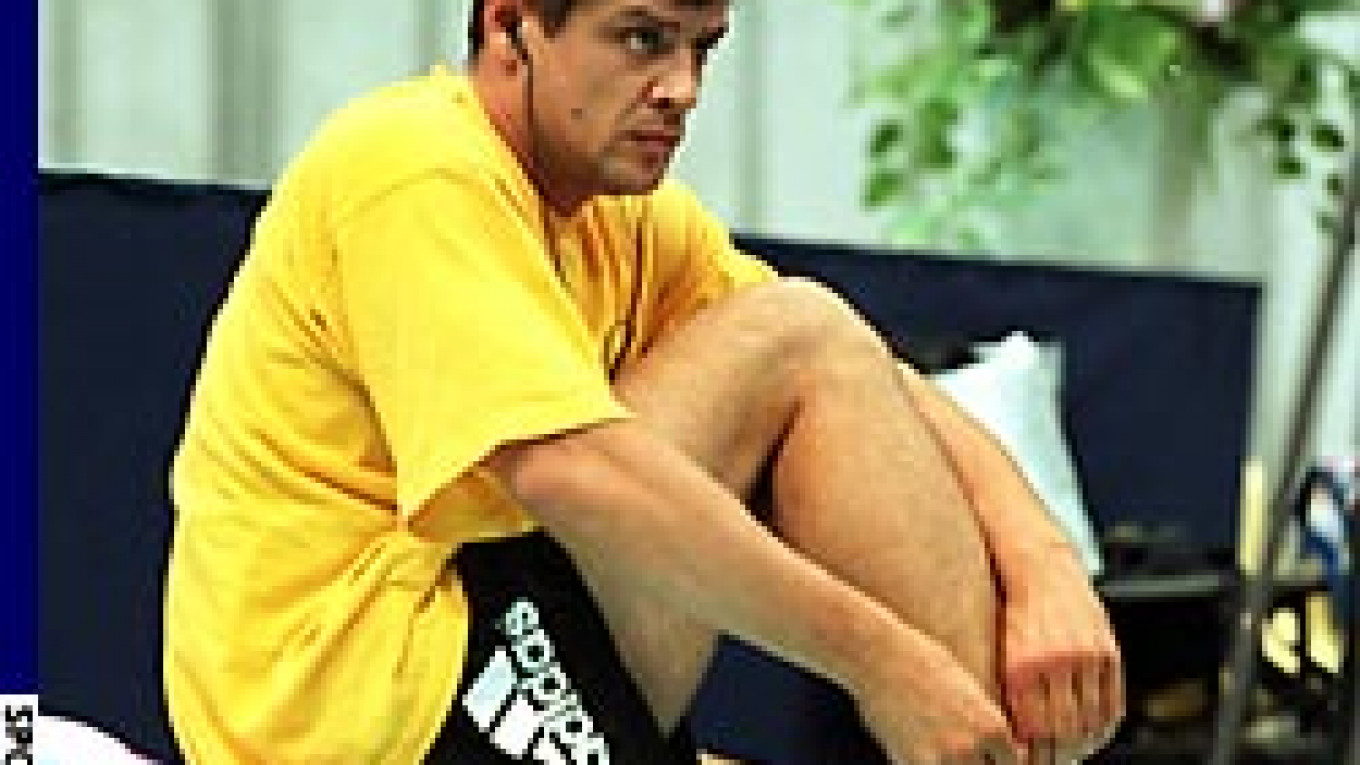Russia?€™s best trampolinist has wowed the world on and off for the last 13 years, but only this year will the four-time world champion trampolinist have a chance to show his grace and skill on the Olympic stage as the sport makes its Games debut. Moskalenko is the hot favorite for the gold medal in his final return to a sport he has loved and left a number of times.
Moskalenko?€™s on-off relationship with the trampoline began in the small town of Pereyaslovka, population 8,000, in the Krasnodar region of southern Russia when he was 7. This choice of sport for a hyperactive 7-year-old was purely coincidental as a local trampoline coach happened to live across the road. Moskalenko was immediately gripped, and after finishing school in 1986 he enrolled in the Krasnodar Institute of Physical Training.
It was there that he met his mentor, Vitaly Dubko, the godfather of Russian trampolining. Dubko is the Bob Fosberry of the trampolining world. His revolutionary technique, which involves jumping higher and spending more time in the air, has been copied all over the world. More dangerous and difficult, it took a year and a half for Moskalenko to feel comfortable with the technique.
"Then it all started rolling," Moskalenko said. In 1988, he won the Soviet championship, and a year later he became European champion and was rewarded with a one-room flat by the Soviet government.
In 1990, not long before the world championship, Moskalenko fractured his spine after a trampoline collapsed under him. Doctors were amazed that he could even walk, but with the aid of painkillers he competed and won his first World Championship.
Injuries are commonplace in trampolining. Moskalenko has broken his leg five times, but even that hasn?€™t stopped him. "When you get that high feeling, no spine or leg can keep you from performing," he said. "There is no stopping [you]."
In 1991, Moskalenko won his second European championship with a broken leg. A year later he defended his title, but as the Soviet sporting infrastructure fell apart ?€” and the perks fell away ?€” Moskalenko got out of the sport.
What happened next was marriage and ordinary life. He found a way to survive like most of his countrymen, buying goods and selling them. He put on 14 kilograms in his year and a half away.
Then when the local Krasnodar sports committee approached him to take part in the 1994 World Championship, it used an economic incentive. If he won the championship, it would give him a three-room apartment. The plan worked, and his family soon after moved to a bigger home.
After becoming world champion for the third time, Moskalenko gave up for good again and swore never to walk into another gym.
But then at the end of 1997, trampolining became an Olympic sport, and the idea of a return was planted in his mind. Even so, a return seemed unlikely.
"I was making good money ?€¦ and I weighed 96 kilograms," recalls the now slender athlete. And by the time of the Olympics, he would be 30, ancient for a trampolinist.
Dubko recalls how Moskalenko turned to him for advice. "It seemed almost impossible, but knowing his nature I knew he?€™d be back," Dubko said.
Moskalenko gave up his business and returned, inspired in part by his memories of victory.
"The feeling of tears coming up to your eyes when the anthem plays is impossible to forget," he said.
But two months before the World Championship in 1998, he broke a leg and refused a place at the championships. Lying on his sofa at home, the team called him for help after a teammate was seriously injured. The team needed him.
Moskalenko reacted as he usually did.
"Get the syringe, get the painkillers, go," he recalled.
He saved the day, the team won but the gold medal went to his synchronized jumps partner German Sychev, and Moskalenko thought of giving up yet again. He even received an offer from a Canadian circus promoter.
Moskalenko continued though, training an average of six hours a day. And it paid off last year when he won the World Championship in South Africa for the fourth time and he qualified for the Olympic Games.
Since then, Moskalenko has spent 20 days a month away from his Krasnodar home at the Novogorsk sports base outside Moscow. He will leave next week for Sydney with the hopes of his training team and the expectations of victory.
"It is a scary feeling, but I know I cannot fail them,?€™?€™ he said.
A Message from The Moscow Times:
Dear readers,
We are facing unprecedented challenges. Russia's Prosecutor General's Office has designated The Moscow Times as an "undesirable" organization, criminalizing our work and putting our staff at risk of prosecution. This follows our earlier unjust labeling as a "foreign agent."
These actions are direct attempts to silence independent journalism in Russia. The authorities claim our work "discredits the decisions of the Russian leadership." We see things differently: we strive to provide accurate, unbiased reporting on Russia.
We, the journalists of The Moscow Times, refuse to be silenced. But to continue our work, we need your help.
Your support, no matter how small, makes a world of difference. If you can, please support us monthly starting from just $2. It's quick to set up, and every contribution makes a significant impact.
By supporting The Moscow Times, you're defending open, independent journalism in the face of repression. Thank you for standing with us.
Remind me later.


